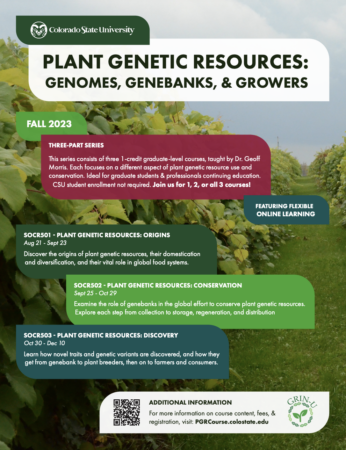- The Museum of Cider has an exhibition on “A Variety of Cultures.”
- Nice podcast rounding up the latest on dog domestication.
- Useful summary of the history of rye in the Nordic countries since it replaced barley in the Medieval period.
- They didn’t give up barley in the Outer Hebrides.
- The Tunisian farmer goes back to wheat landraces (I think).
- The Kenyan farmers who want to exchange landraces.
- El Colombiano visits Future Seeds, evokes The Walking Dead.
- Seed saving resources from the California Seed Bank and the herbarium at the University of California, Berkeley.
Nibbles: Fonio beer, ICRISAT seed kits, Dark Emu, China potatoes, 3D genebank, Bioculture, Microbiome genebank, Nutrition, Michigan kiwi
- You can make beer from fonio.
- ICRISAT providing Niger and Chad with sorghum and pearl millet seed kits. Fonio next?
- No, Echinochloa turneriana next. In Australia. I love the Dark Emu Hypothesis, and not least for its name.
- CIP is helping China improve its potato crop.
- Won’t be long before China’s genebank has 3D images of all its holdings. I’d love to see the potatoes.
- Want to see the earliest known site of domestication of teosinte?
- UK builds first crop biome cryobank.
- How the private sector can help with a more nutrition-sensitive agriculture. Should it want to.
- You can grow kiwi in Michigan. Should you want to.
Nibbles: Alt-proteins, NPGS, Serviceberry, Fungal diseases, Old Irish farm
- The benefits of alt-proteins spelled out in a report from the Center for Strategic and International Studies. I bet they’ll need alt-genebanks.
- The US national genebank system expertly deconstructed in a page.
- Bozakmin, the best of the berries, used to contrast late stage capitalism with Indigenous gift economies. Well worth the long read.
- Comment in Nature about how we are not taking fungal diseases of crops sufficiently seriously.
- There’s a place in Ireland with a 6000 year history of farming. Well maybe that’s rounded up a bit.
Nibbles: Calabrian citron, Cherokee seeds, Indigenous food systems & community seed bank in India, NZ apple diversity, Climate funding for food
- Calabrians are growing citrons under solar panels to protect them from the heat.
- The Church of the Good Shepherd in Decatur, Alabama is growing seeds from the Cherokee Nation Seed Bank in its gardens, and that’s a sort of homecoming.
- The Indigenous agrobiodiversity and food systems of Meghalaya in India’s NE are helping local people cope with extreme climatic conditions.
- Elsewhere in India, there are community seed banks to help with resilience.
- And in New Zealand, the Volco Park Cultivar Preservation Orchard is helping academics teach about crop diversity.
- Meanwhile, only 3% of climate funding is going into food systems.
Genomes, Genebanks, and Growers… The Course
 Your regular reminder that Colorado State University runs a great course entitled Plant Genetic Resources – Genomes, Genebanks, and Growers. And they’re now taking registrations for the Fall 2023 semester. Go for it. You won’t regret it.
Your regular reminder that Colorado State University runs a great course entitled Plant Genetic Resources – Genomes, Genebanks, and Growers. And they’re now taking registrations for the Fall 2023 semester. Go for it. You won’t regret it.
There are online training resources at GRIN-U, courtesy of the same project.